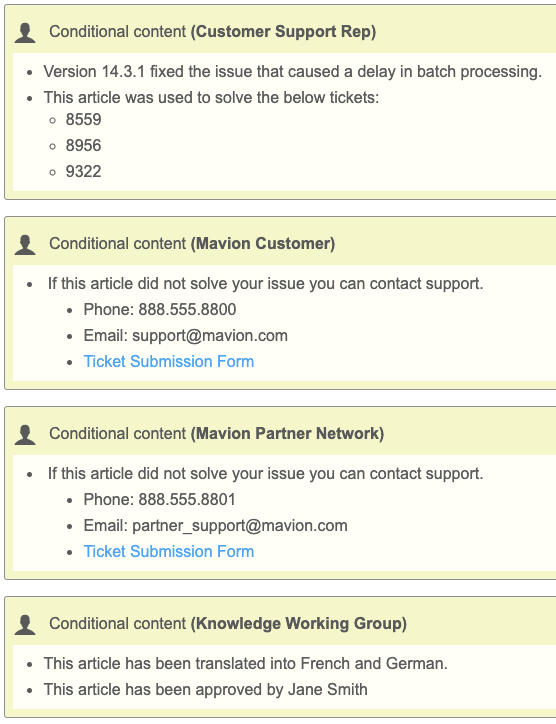Leverage Conditional Content
Create a personalized experience by leveraging conditional content to simplify the management, organization, and creation of self-service knowledge across your customer journeys. Conditional content empowers you to help agents, employees, partners, and customers to discover content relevant to their needs through search, navigation, and everywhere you extend your content.
Why you should use Conditional Content
- Centralized and simplified content by persona creates a lower effort experience for your customers and content creators
- A personalized customer journey increases engagement with your audience
- Removal of unnecessary search results creates a streamlined search experience and reduces the time it takes to self-serve
What is a centralized and simplified customer journey?
With conditional content you have the ability to surface only relevant knowledge appropriate to your audience. This centralized knowledge management technique creates a lower effort experience for you and your users, by allowing you to combine content for different personas in one knowledge article.
Here are some examples of what that content could be:
- Agent only information that needs to be communicated to the customer
- Customer messaging to contact support if they are unable to solve the issue themselves
- Vendor, Partner, or third party messaging to contact an alternative support line
- Knowledge manager specific notes such as where the article is being reused, what ticket triggered the creation of the article, or translated versions of the article.

How does a personalized customer journey increase engagement?
Imagine one article that addresses all the different scenarios and personas below.
Scenario: Anonymous Personas
A potential customer accesses your support site to research a possible solution to their problem. They are presented with high level information about how your product solves their problem. In addition to this information, they will also see call to action buttons to sign up for a demo and purchase your product to further their customer journey towards purchase.
An existing customer who has not logged in comes to your site to learn about a particular functionality. They are presented with the same high level information about your product and a prompt to login to see additional content to further their journey to success with implementing your product.
Scenario: Logged in Personas
A support customer has logged into the article to learn how to solve an issue. On this page they are presented with the a detailed, step by step answer and a contact support button if their problem requires agent assistance. This creates the opportunity for a lower effort support experience for the customers who can solve their issue with self-service and an quick option to contact support for more complicated issues that cannot be solved without intervention.
A potential upsell customer views the article looking to upgrade their product with this same functionality and are presented with a call to action to contact their account manager for details on how to upgrade.
A long term customer viewing the same article is given the opportunity to participate in an early access program with a call to action presented only to your most valued customers.
How does a streamlined search experience improve self-service?
When you centralize your knowledge experience by using conditional content, your audience is presented with less information to sort through, which will streamline their search experience. This means that you and your users will receive contextually relevant results, that will reduce time and effort no matter where the search is located:
- Web
- Customer Relationship Management
- Ticketing system
- In-Product
- Community
- Marketing
- eCommerce
- Blog
- Etc.
If Conditional Content is something you would like to use in your self-service knowledge strategy, please read the following articles.

